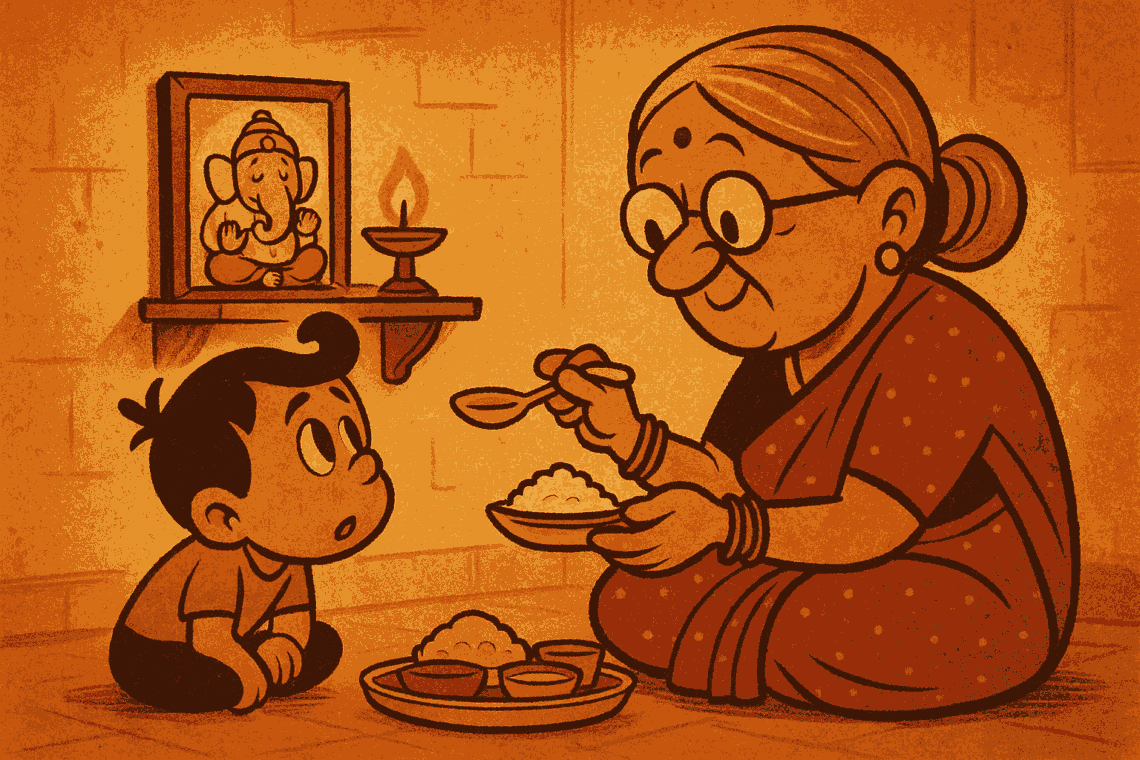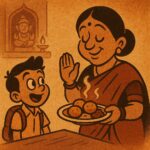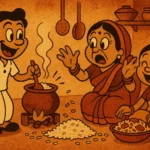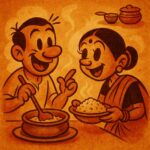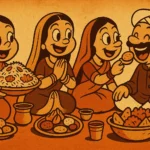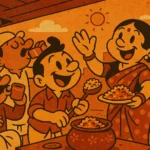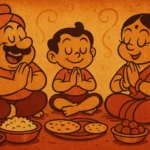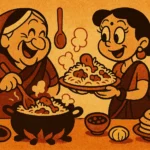Growing up in Mumbai, our family dining table wasn’t just about hunger—it was about hierarchy. And at the top of that hierarchy, ahead of grandparents, parents, and even the smallest, hangriest child, was God. Specifically, whichever deity had taken up residence in the corner shelf of our kitchen shrine that week. Because in our house—and in countless others across India—no one ate before the gods did.
Even now, decades later in my Austin home, I sometimes find myself pausing before the first bite. A reflex. A muscle memory. A whisper of my grandmother’s voice saying, “Wait—let me offer it first.” And then she’d carefully pinch a bit of rice, a drop of ghee, a smudge of kheer, and place it in a little silver vati before the image of Ganesha. Only after that would the meal begin.
Naivedyam: Food as Devotion
This practice is called Naivedyam—the act of offering food to a deity before consuming it yourself. It’s not just ceremonial. It’s intimate. A kind of divine courtesy that says: “You first.” And it’s older than almost every culinary tradition we know. In the Vedic worldview, food isn’t just nourishment; it’s prasad when offered, karma when consumed, and a bridge between the physical and spiritual when shared.
The food itself isn’t transformed by some Harry Potter-level magic when offered. What changes is the intent. The ladle becomes an offering spoon. The kitchen becomes a temple. And that moment of pause—that slight delay in gratification—adds a layer of mindfulness to something as simple as eating.
The Art of Waiting (and Smelling)
As a child, the wait was unbearable. My mother’s pongal would be steaming on the plate, the smell of ghee and pepper making my stomach growl, and I’d have to stand there, watching her place a spoonful in front of our tiny brass Lakshmi. Sometimes she’d even light a camphor lamp while my lunch cooled to an unacceptable degree of not-hot. It felt like divine favoritism. I used to think, “Surely God doesn’t need to eat before I do?”
But over time, I came to see it differently. That wait—that 15 seconds of stillness—became a ritual of respect. Not just for the divine, but for the food itself. For the effort behind it. For the idea that something as earthly as aloo sabzi deserved a moment of reverence before becoming fuel.
Offering as Memory
There’s also something profoundly emotional about offering food to the gods. In our family, it wasn’t just about religion. It was about remembrance. On my grandfather’s shraddha day, my grandmother would make his favorite paalak khichdi, set a banana leaf before the family shrine, and serve it just like she did when he was alive. No one would touch their plate until she whispered something under her breath, folded her hands, and lit a single incense stick.
In that moment, food became story. Offering became communication. And even though I couldn’t hear what she said, I understood what she meant.
Bringing It to Austin
In my home now, things are simpler. We don’t have a formal shrine, just a small framed photo of Ganpati on a kitchen shelf. But on certain days—usually when I make something that tastes close to what my mother used to cook—I catch myself setting aside a little portion on a saucer. It’s not elaborate. No chanting. No bells. Just a quiet gesture. An instinctual thank-you to something beyond the ingredients.
My son, born and raised in Texas, once asked me, “Why do you feed the photo?” I laughed. Then I said, “It’s just our way of saying thanks before we eat.” He nodded like he got it. Then promptly asked if the gods would mind if he started without them.
Is It About Belief?
Not always. Sometimes it’s about rhythm. About creating space in a daily act that can become too mechanical. Offering food first slows things down. Makes the moment deliberate. Even in a world of takeout and desk lunches, there’s something grounding about acknowledging the plate in front of you—not just as calories, but as connection. To your roots. To your rituals. To that small, stubborn idea that food is sacred when shared, even symbolically.
That First Bite
I still remember the taste of the first bite after offering. Always a little more special. A little more alive. Like the food had been blessed—not by a god, but by patience. By pause. By that tiny, beautiful tradition of saying: “Let the divine eat first.”
Born in Mumbai, now stir-frying feelings in Texas. Writes about food, memory, and the messy magic in between — mostly to stay hungry, sometimes just to stay sane.

